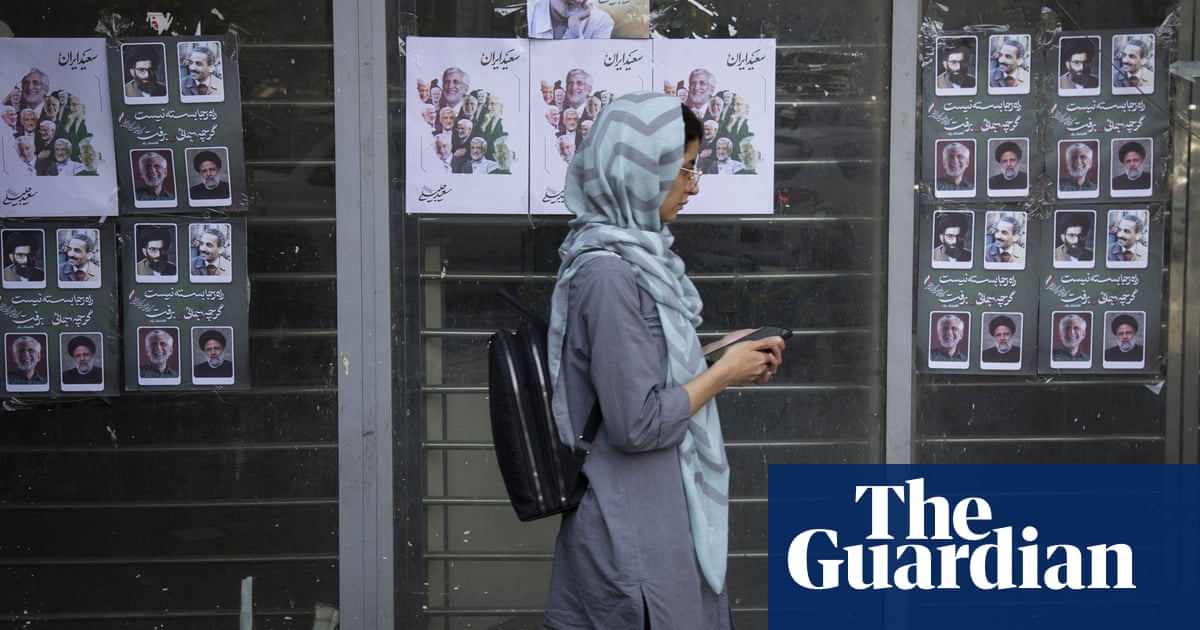More than 61.5 million Iranians aged over 18 have been given a chance to vote for a new president and send a message to the regime about the state of the economy. However, millions are expected to boycott the election on Friday, the outcome of which they believe will be manipulated by the regime to ensure a loyalist victory.
Iran’s leaders want to renew their legitimacy after a steady decline in turnout reached crisis point last year with fewer than 41% voting in parliamentary elections, and fewer than 10% in the capital, Tehran.
The vote comes after President Ebrahim Raisi died in a helicopter crash in May.
]The two conservative frontrunners, Saeed Jalili, a former nuclear negotiator with little or no administrative experience, and Mohammad Bagher Qalibaf, the speaker of the parliament, failed to agree to a pre-polling day pact that would see one of them stand aside. That failure opens the door to the possibility that the sole reformist candidate permitted to stand, 69-year-old heart surgeon Massoud Pezeshkian, will make it to a two-person run-off. Such a run-off is required if none of the four candidates in the race reach 50% in the first round.
Jalili, an opponent of the 2015 nuclear deal, believes Iran can withstand western sanctions by building economic ties to the east. He is also the most ideological about using the powers of the state to enforce the hijab on Iranian women, and has the support of the Front of Islamic Revolution Stability, or Jebhe Paydari, a group that has fallen out with Qalibaf. Qalibaf has said he is willing to negotiate on reviving the nuclear deal, and regards stronger management of the economy as the route to growth.
At the 11th hour Jalili was still pressing Qalibaf to stand down, saying Qalibaf’s sacrifice may be the only way to stop Pezeshkian and what will effectively be the third term of Hassan Rouhani, the centrist whose two-term presidency ended in failure in 2021, largely due to the US pulling out of the nuclear deal. The poll is a huge test of the reformists’ continued relevance in Iranian politics.
The regime has tried to weaken Pezeshkian’s bid, including banning one of his final rallies. The supreme leader, Ayatollah Ali Khamenei , gave a speech on the eve of the vote condemning “certain Iranian politicians” for believing “all paths to progress pass through the United States”, remarks clearly aimed at Pezeshkian’s call to end Iran’s economic isolation from the west.
At the last minute, two of the five conservative candidates permitted to stand by the Guardian Council – Amir-Hossein Ghazizadeh Hashemi, a supporter of Raisi, and Alireza Zakani, the mayor of Tehran – stood aside, confirming reformist accusations that they had been front candidates for Jalili.
Many Iranians, disillusioned by successive crackdowns, question the value of the democratic process, and plan stay away rather than lend the process a veneer of legitimacy. One member of generation Z told the Guardian: “With its killings, the regime has made the issue of not voting one of personal dignity.”
Both Pesezhkian and the supreme leader want a high turnout – closer to 60% – but for different motives. Pezeshkian needs to persuade a depoliticised society to come out to defeat the 15 million or so supporters of the regime. The supreme leader has argued: “High turnout brings honour to the Islamic republic. Every election with low participation gives our enemies reason to criticise us. We must not give them that satisfaction.”
It is also questionable whether the allies of the supreme leader, given his views about America and cultural values, would tolerate a Pezeshkian presidency. Pezeshkian, for his part, has repeatedly stressed he will accept Khamenei’s authority, and insisted that obedience will not prevent him changing Iran.
A new paper by United against a Nuclear Iran, a US pressure group, argues the level of electoral manipulation by the regime goes far wider than simply doctoring the list of eligible candidates. The report highlights the role of the Baqiatallah Cultural and Social Headquarters, which the report says has created a full apparatus and strategy to engineer political and cultural outcomes in Iran.

